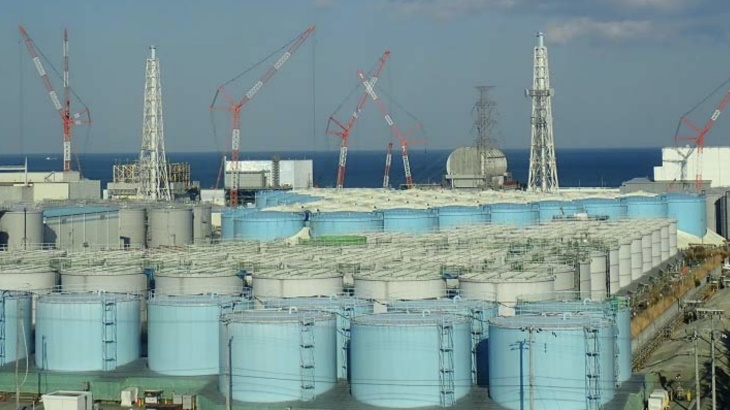 Water storage tanks at the Fukushima Daiichi plant site (Image: Tepco)
Water storage tanks at the Fukushima Daiichi plant site (Image: Tepco)
At the Fukushima Daiichi site, contaminated water - in part used to cool melted nuclear fuel - is treated by the Advanced Liquid Processing System (ALPS), which removes most of the radioactive contamination, with the exception of tritium. This treated water is currently stored in about 1000 tanks on site. The total tank storage capacity amounts to about 1.37 million cubic metres and all the tanks were originally expected to be full around mid-2022. However, last month Tepco said it now expects the tanks to reach full capacity in mid to late-2023.
Japan announced in April 2021 it planned to discharge treated water stored at the Fukushima Daiichi plant into the sea over a period of about 30 years, and asked the International Atomic Energy Agency (IAEA) to review its plans against IAEA safety standards which "reflect an international consensus and serve as a global reference for protecting people and the environment from the harmful effects of ionizing radiation".
Tepco submitted its application for the basic design of the ALPS-treated water dilution/discharge facility and related facilities to the NRA on 21 December 2021. Under the plan, the treated water will be diluted with seawater so that the amount of tritium contained will be smaller than one-fortieth of state-set standards. The diluted water will then travel through an undersea tunnel and be discharged about 1 kilometre off the coast.
"Regarding the design, facility and security of ALPS-treated water dilution/discharge facility and related facilities and the report on radiological impact assessments regarding the discharge of ALPS-treated water into the sea, Tepco has taken seriously the items pointed out by the NRA during review meetings and by the IAEA," the company said. "Tepco has reflected these items onto the revised applications for approval to amend the implementation plan."
In May, the NRA released its draft report on Tepco's application, giving its consent for the water dilution and discharge plan. A 30-day public comment period followed. The regulator has now given its formal approval of Tepco's plan, incorporating the amendments submitted by the company.
"By this approval, safety of the installation of the ALPS-treated water discharge facility has been confirmed," Japan's Ministry of Foreign Affairs said in a statement. "Nevertheless, this does not mean that Tepco can immediately start the discharge of the ALPS-treated water into the sea. Before doing so, remaining processes, such as NRA's Pre-Service Inspections to check and confirm the installation status of the discharge facilities, will continue. The discharge of the ALPS-treated water into the sea will not start until after these steps are duly taken.
"The IAEA will continue to conduct its independent review throughout, including while these steps are taken, and the Government of Japan will carefully consider the findings and observations from the IAEA's review."
Nearby countries have been alarmed by Japan's plan, but the IAEA says that the level of tritium in the water will be "well below national regulatory limits and the World Health Organisation standards for drinking water".
Tepco said: "In addition to cooperating fully with reviews by the IAEA, we will continue to thoroughly implement measures based on the Japanese government's basic policy that will ensure safety according to the implementation plan, provide accurate information based on scientific evidence to parties in Japan and abroad such as the radiological impact on the public and the environment, and strengthen monitoring of radioactive materials."
